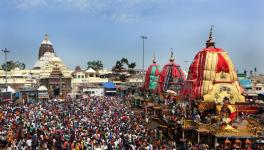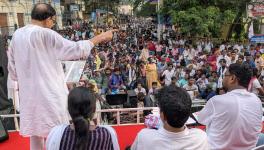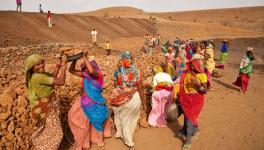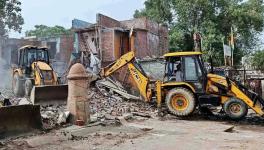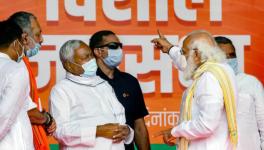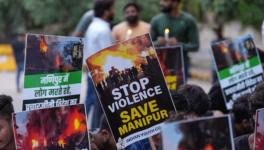Gujarat Elections: Clean Drinking Water a Far-fetched Dream for Village in North Gujarat
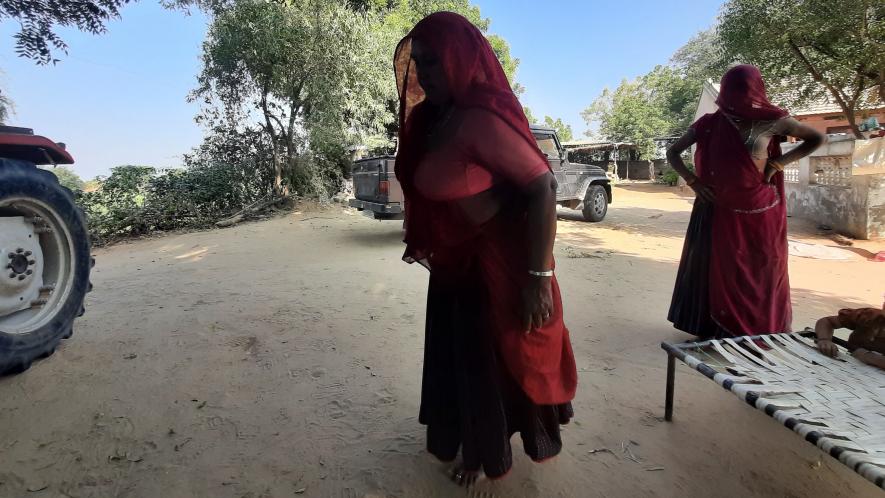
Vibha ben is just 45, but looks much older. Old age for many in the village is a premature guest, purportedly due to the toxic water. | Images by Hrishi Raj Anand
Khoda, Tharad: In the rest of India, when people visit their relatives, they take chocolates, biscuits, or sweets for the kids and the family. In Gujarat’s Khoda, the story is different. It is probably one of the few villages, where the guests bring mineral water for their families who otherwise are exposed to extremely harmful water – strictly prohibited for human use.
Limping as she stared at the car, 45-year-old Vibha ben walked out to greet the reporters with hope in her eyes, thinking someone was here to solve the village’s problems with drinking water that lead to conditions as painful as hers.
Offering the guests some tea, with a smile on her face, Vibha jested, “Only the water here is bad. Do not worry; we will offer you some good tea.” As she sat down on a low charpoy, one could sense the pain she was enduring from her facial expressions. She had to go down bit by bit until she finally sat down. The toxicity of the water has affected Vibha, her family, and most of their village.
The TDS level of the water consumed in Khoda is very high. The optimum healthy water range falls somewhere between 50-150 PPM. On the contrary, the water consumed by the villagers of Khoda has a value between 800 and 1800 PPM according to a Central Ground Water Board (West Central Region) report – making it totally unsafe for human use.
To give this reporter a live demo, Narsi, who had been taking him door to door, brought a mug of water for the reporter to drink. “Here, take a sip of this and you would know what we drink on a daily basis.” And indeed, the water was way too salty – opposite of what the usual groundwater tastes like – and left an acidic aftertaste.
Elderly farmers lie with their legs crossed, as they can not walk a lot more than ten steps. The young ones, too, have trouble walking, while the 35-year-olds say that the pain has been increasing with each passing day. However, the crisis is so widespread that the condition of being bedridden has been normalised in Khoda with most people expecting it to happen sooner or later.
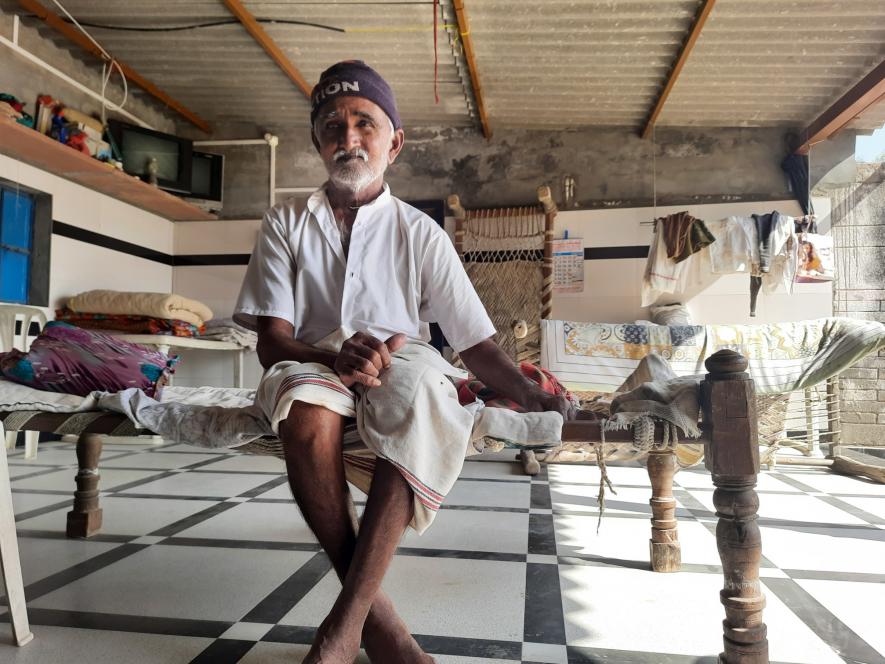
Ratna Ramji Patel, who was completely healthy until four years ago, is weak and pale now; he struggles to even reach the washroom.
On enquiring at the local government dispensary in the central part of the village, NewsClick found out that the medicines sold most often here were typically painkillers. People, on a daily basis, come to the dispensary asking for medicines to cope with their back, hand, and knee pain.
Women in the village have an important role to play in the fields as well as at home. They are the backbone of the family. With Vibha’s illness increasing with each passing day, the burden of responsibilities has now fallen on Sita, her 23-year-old daughter-in-law. “I do not think I will be able to walk anymore. It is only a matter of two-three years. Maybe if you come to visit me before the next election, you will find me in the bed,” said Vibha. She talked about how she could walk for hours before and handled the household chores. But now, the only way she can contribute is by taking care of the kids.
While Vibha’s health issues are too severe for her age, many women like her have started to see the impact of the poisonous water. This reporter travelled across North Gujarat and went up to Kutch as well. In other parts, one could see even 90-year-old farmers walking around their fields. But Khoda presented a stark juxtaposition.
The 60-year-old Ratna Ramji Patel lied pale on his charpoy and after several moments of failed attempts to sit straight, finally, put both his legs down to greet the reporters. His legs do not work anymore and they have also shrunken in size from before, he said. Now, most of the time, he has no option but to lie on the bed with his legs crossed which do not open until members of the family help him.
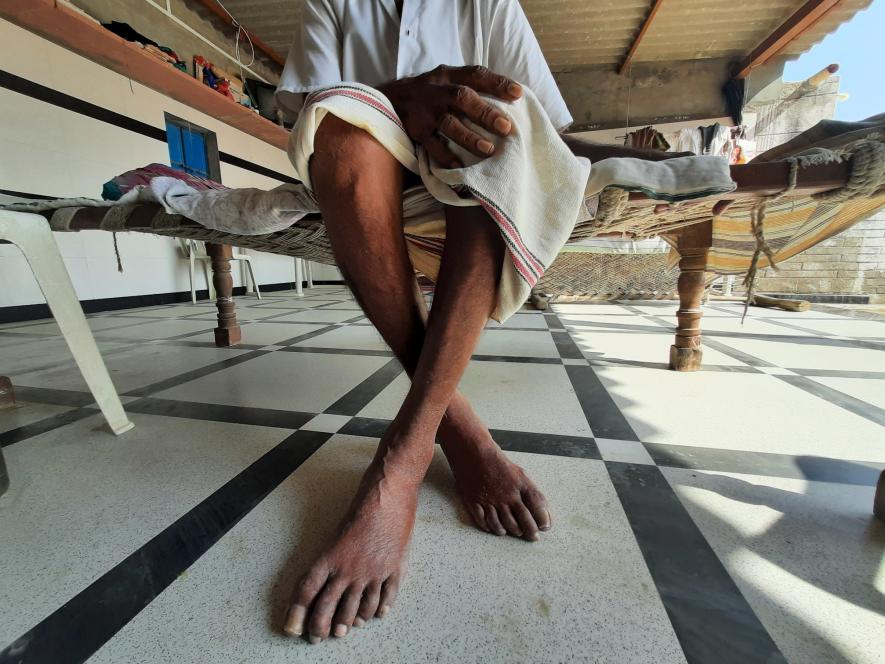
The senior citizens and many above 50 years of age in Khoda, Tharad lie bedridden purportedly due to the high level of TDS in drinking water, which has severely affected their mobility.
“My hands work absolutely fine; I do not have any problem talking to you. But you see my legs. I sometimes feel like I am cursed that my family is drinking such water,” said Patel. His son works in the same field that is right behind his house as he sits in the corner of the ‘angan (front yard)’ and watches his son work. Every morning – he said – he hopes for his legs to start working miraculously, but he has seen them get worse from worse. Five years back, he first had to start using a stick due to immense back and leg pain. Later, he started using a walker and used it until a year back – when he had no option but to walk only when he had to use the washroom. Often, not even for that. “I want to walk. I am still fairly young, but the doctors say that my legs are of no use now, all because of the water I have been drinking,” he said.
Vibha’s daughter-in-law, Ramji’s son and hundreds more in the village who either see the pain starting or see their elders getting older sooner than usual can predict their fate as well. They know that drinking water with such high Total Dissolved Solids (TDS) levels is bound to make them as sick as their elders are today. But they are helpless in this last village of Gujarat near the Rajasthan boundary.
“Can our problem not be solved? Or is it impossible to get us drinking water?” asked Narsi as he took this reporter to another house in his Bolero car. He has traditionally been a BJP supporter just like many others in the village, but blames all the leaders across political parties for not bringing drinking water to Tharad. These villagers do not even get the facility of a water tanker that otherwise is available in most villages of Gujarat’s Northern districts.
Gulab Singh, the current MLA of the place has been promising them drinking water for several years now. But the borewell water level has gone further and further down with water getting more and more toxic. The new candidate, Shankar Chaudhary from BJP, has guaranteed that the villagers will get “meetha paani (clean water)” if he comes to power.
Vibha ben has two sons, one of whom lives with her in the village, while the other resides in Pune, Maharashtra where he works. He comes to visit his mother every few months. During his visits, he makes a trip to the city every day, to get gallons of mineral water for the kids and the family. “Whenever he is here, the days are good. We get to drink fresh water, it seems like ‘amrit (ambrosia)’ to us. However, this happiness lasts only a few days,” she said. Whenever Vibha receives a call from anyone planning to visit her, she asks them to get water for her family. “Even if it is for a single day, it feels good to feed our kids the water they deserve to have,” she said.
In the state that promises a development model to the world, and advertises double income for farmers, villagers of Khoda still search for their turn to have clean drinking water this Assembly election.
The writer is a freelance journalist based in Delhi and is travelling to Gujarat to report on the Assembly elections.
Get the latest reports & analysis with people's perspective on Protests, movements & deep analytical videos, discussions of the current affairs in your Telegram app. Subscribe to NewsClick's Telegram channel & get Real-Time updates on stories, as they get published on our website.









